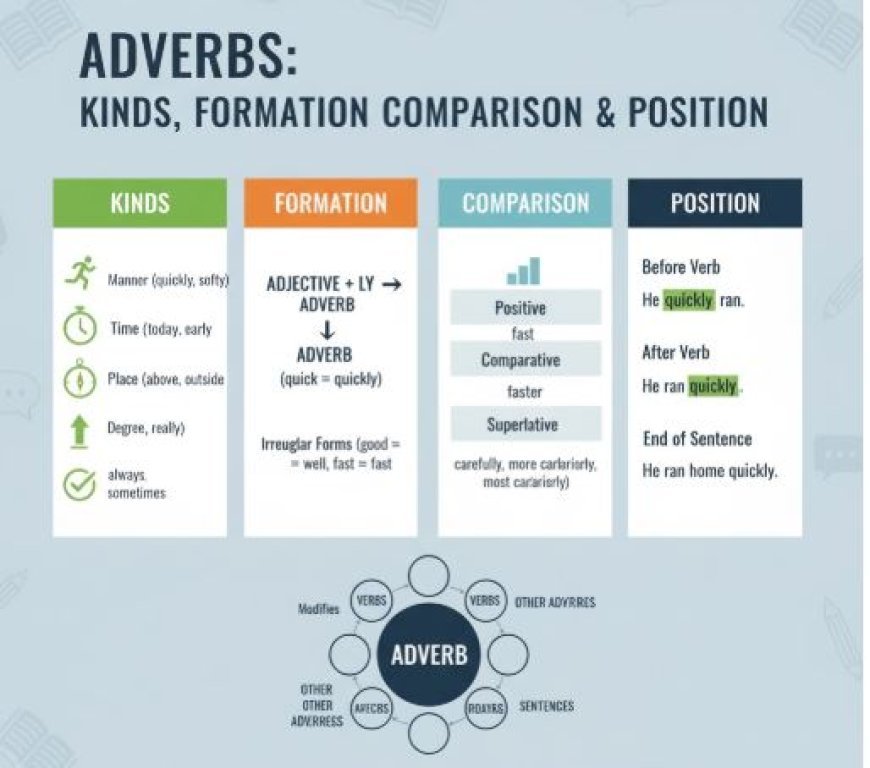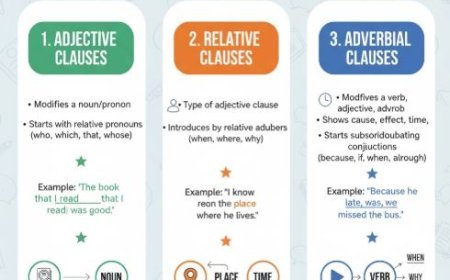KINDS, FORMATION, COMPARISON AND POSITION OF ADVERBS
Adverbs: Verb bodyguards (protect with detail) - some wear capes (-ly), compare feelings, and move around freely.

ADVERB
When it comes to the English language, adverbs are one of the most commonly used parts of speech.
- Adverbs are used to describe or modify verbs, adjectives, and other adverbs.
- They are essential in providing more information about the action, quality, or degree of the word they are modifying.
- For example, in the sentence 'She sings wonderfully,' the adverb 'beautifully' modifies the verb'sings' and indicates how she sings.
Kinds of Adverbs
There are several kinds of adverbs, each serving a different purpose in a sentence.
- Adverbs of Time: These adverbs tell us when an action is performed.
For example, 'She arrived early' or 'I always brush my teeth before bed.'
- Adverbs of Place: These adverbs tell us where an action is performed. For example, 'They
- travelled abroad' or 'He left the keys there.'
- Adverbs of Manner: These adverbs tell us how an action is performed. For example, 'She walks gracefully' or 'He speaks softly.'
- Adverbs of Frequency: These adverbs tell us how often an action is performed. For instance, "I never skip breakfast" or "She rarely attends the gym."
- Adverbs of Degree: These adverbs tell us the extent or intensity of an action. For example, 'He ran very fast' or 'She is extremely talented.'
Formation of Adverbs
- Most adverbs can be formed by adding -ly to an adjective, such as 'quickly' from 'quick' or 'patiently' from 'patient.' However, there are some adverbs that do not follow this pattern.
- For example, the adverb for 'good' is 'well,' and the adverb for 'late' is 'lately.'
Comparison of Adverbs
- Just like adjectives, adverbs can also have comparative and superlative forms to compare two or more things.
- For example, 'She sings better than I do' (comparative) or 'He sings the best in our
- choir' (superlative).
Position of Adverbs
- The position of an adverb in a sentence can change its meaning or emphasis.
- Adverbs are usually positioned following the verb they are changing. Nonetheless, frequency adverbs are often positioned before to the primary verb.
- For example, 'She always eats breakfast.' Additionally, adverbs of manner can be placed at the end of a sentence for added emphasis. For example, 'She sings beautifully, without a doubt.'
Examples
- Adverb of Time: 'He will arrive soon.'
- Adverb of Place: 'They live nearby.'
- Adverb of Manner: 'I danced gracefully.
- Adverb of Frequency: 'I hardly ever eat fast food.'
- Adverb of Degree: 'She speaks very softly.'
- Comparative Adverb: 'They speak more clearly than I do.'
- Superlative Adverb: 'He plays the guitar the best in the group.'
- Adverb Placement: 'She sings beautifully compared to the other contestants.'
- Adverb Placement for Emphasis: 'I will never forget that experience, ever.' effectively and clearly in both spoken and written languages.
What's Your Reaction?



































